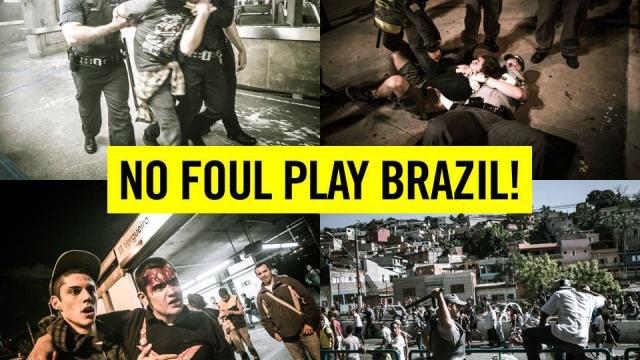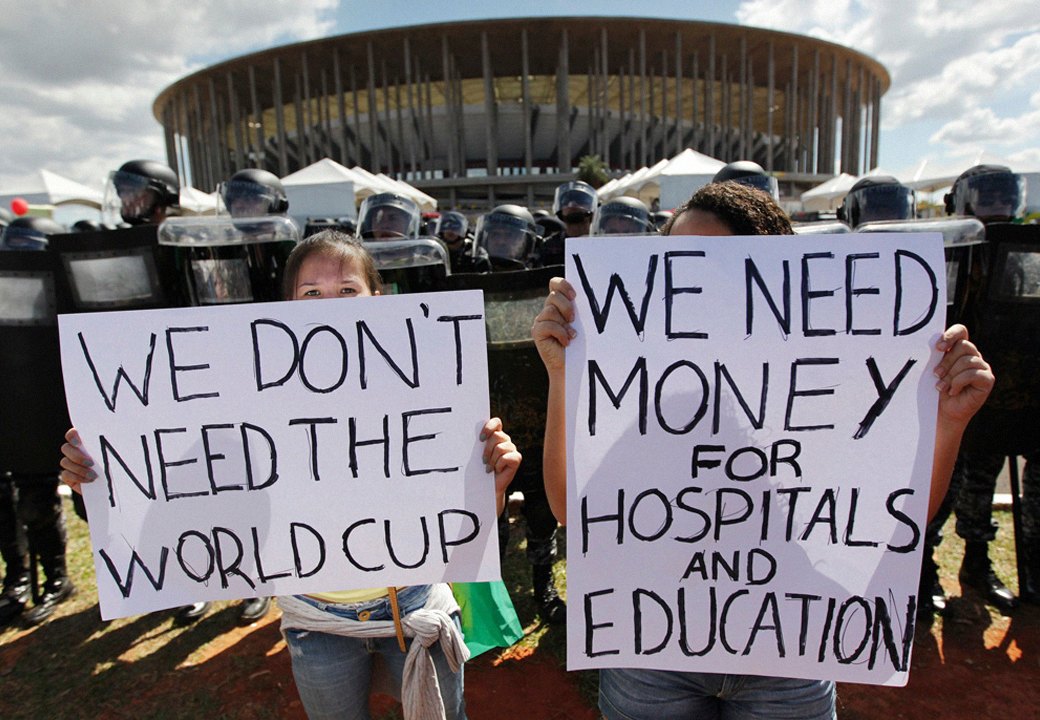
RIO DE JANEIRO – With the World Cup just three days away, Brazilians are demanding justice as deaths continue to be reported at construction sites and the rights of workers get quashed, even while government promotes the world’s most important soccer event as a Cup for the ages.
Now, as dissent grows increasingly dangerous, the Brazilian chapter of Amnesty International has launched a campaign urging authorities to guarantee the constitutional right to protest during the soccer tournament, which begins Thursday. The campaign was prompted by growing police violence against demonstrators in the wake of last year’s nationwide protests.
The Amnesty campaign – which has received more than 94,000 signatures and counting – is called Yellow Card, in reference to the cautions a referee issues during a soccer match. Its aim is to call attention to legal and security aspects relate to the right to demonstrate.
It asks for stricter regulations of the use of aggressive weapons such as tear-gas, rubber bullets and pepper spray as well as techniques like kettling, which was used in São Paulo to surround a group of peaceful demonstrators who took to the streets in February. The global human rights organization says Brazilian police forces are ill-prepared and not properly trained to deal with public demonstrations.
The campaign also highlights attempts by lawmakers to criminalize protests altogether.
“We are concerned about violence against protesters as well as the criminalization of demonstrations. Brazilian legislation is being misapplied for that purpose,” Amnesty International’s human rights advisor Renata Neder told Occupy.com.
Among the legal excesses is the use of legislation aimed at organized crime and urban militia as well as a security law introduced decades ago during Brazil's military dictatorship. Neder said there are more than 10 proposed bills currently being pushed through Congress to curb protest action.
“Some of the bills introduce requirement of authorization to protest, another outlaws wearing a mask. Depending on the final drafts of those bills, they could lead to more restriction and longer sentences,” she added.
So far, attempts by Brazilian lawmakers to qualify protest as acts of terrorism have not succeeded, with government backing down and stating that it will instead opt for legal tools already in place to deal with violence.
“It’s a sign that the pressure is working,” Neder said.
Another concern raised by Amnesty is the way that cases of violence by police forces against civilians will be dealt with under law. “Reporting mechanisms are not clear and effective enough,” she said, and "we want these cases to be properly investigated.”
The organization is also concerned about the deployment of armed forces during the tournament, which will be supporting the police. “They need to be submitted to the same responsibility mechanisms as the police,” Brazil's Amnesty International director Atila Roque said in a recent press statement.
Neder added that the protests have started a healthy debate about the role of police – and the demilitarization of police forces – in Brazil. They opened a window of opportunity for society to talk about the issue, something seen as especially important in an election year.
The petition was initially delivered to President Dilma Rousseff and Senate leader Renan Calheiros on June 2, 10 days before the tournament.
Pre-Cup Mood
In the run-up to the Cup, protests have continued to take place across Brazil, especially in São Paulo, the stage for two major demonstrations in May. Parallel to that, other forms of protest such as the humorous Vai Ter Cópula, with 28,000 people confirmed on Facebook, invites people to have sex during the matches instead of watching the games. (The date of the opening, June 12, is Valentine’s Day in Brazil.)
“The traditional media has worked hard to manipulate information and paint the protests as a criminal act. The Cup has become a symbol of all the frustration of a social class that has acquired a certain economic level but whose growing expectations are no longer met,” says A.B., an activist based in Vitória, a city that saw some of the biggest demonstrations last June when a quarter of the 400,000-strong population took to the streets.
Despite less numbers of people actually going into the streets to protest, due largely to fears of police violence, enthusiasm for the tournament has been lackluster at best. Considering the country’s soccer-mad reputation, it was expected that the streets would be painted green and yellow (the colors of the Brazilian flag), which in most cases hasn't happened. The Brazilian team was even received in Rio with a protest by school teachers.
Frustration with the Cup, FIFA and Brazil's government continues to run high, as corporate media here are desperately trying to whip up patriotic sentiment to ensure high rates of viewership. State-condoned violence may have partially succeeded in keeping people off the streets, but it has failed to colonize hearts and minds.
3 WAYS TO SHOW YOUR SUPPORT
- Log in to post comments
















